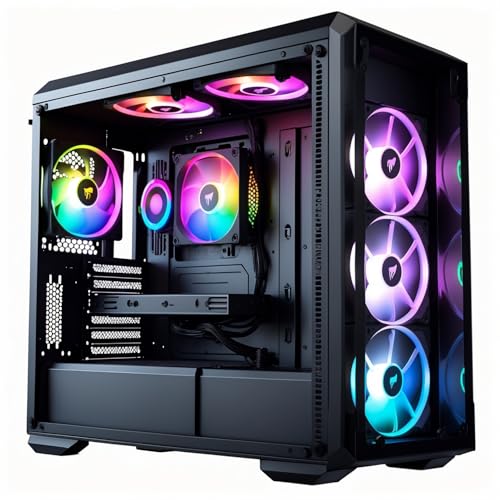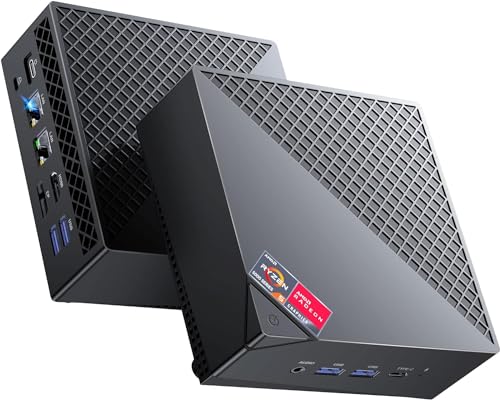Understanding High-Performance Gaming PCs: What Makes Them Stand Out
Why High-Performance Matters in Gaming
When we dive into the world of gaming, performance is key. A high-performance gaming PC ensures smooth gameplay, stunning graphics, and quick load times, all essential for an immersive experience. Think of it like driving a sports car versus a regular car. While both will get you from A to B, one offers excitement and thrill that can really enhance your enjoyment.
The Visual and Interactive Experience
High-performance PCs deliver lifelike graphics and seamless frame rates. When playing a game, imagine navigating through a vast open world filled with intricate details—without lag or stuttering. High refresh rates and supported resolutions mean the visuals are crisp, making you feel as if you’re inside the game rather than just playing it.
Competitive Edge in Online Gaming
If you’re into online competitions, high-performance gaming PCs give you an edge. Fast processing speeds and the ability to handle multiple tasks ensure that you react to in-game events quicker than your opponents. Picture a moment when every millisecond counts—having a high-performance PC could be the difference between victory and defeat.
Key Components to Look For: CPU, GPU, RAM, and Storage Explained
The Heart of the Operation: CPU
At the core of every gaming PC is the CPU, or Central Processing Unit. This acts like the brain of your machine, processing all the data. A powerful CPU ensures that the gaming experience remains fluid and responsive, especially during complex game sequences. We recommend a multi-core processor as it can handle multiple tasks effectively, providing the necessary power for today’s demanding games.
Graphics that Captivate: GPU
The Graphics Processing Unit, or GPU, is crucial for rendering visuals. It determines how detailed and beautiful games appear on your screen. Investing in a high-quality GPU can lead to stunning graphics and smooth frame rates. Consider models that can easily handle the latest games at high settings while still maintaining good performance.
Memory Matters: RAM
RAM, or Random Access Memory, is essential for multitasking and game performance. More RAM allows your computer to handle multiple applications at once without slowing down. For gaming, we suggest at least 16GB, which is plenty for most titles today, but if you plan to use resource-intensive applications alongside gaming, 32GB would be a good investment.
Storage Solutions: HDD vs. SSD
Where you store your games can significantly impact load times and performance. Solid State Drives (SSDs) are faster than traditional Hard Disk Drives (HDDs), leading to quicker booting and loading of games. We recommend opting for an SSD for your operating system and most played games, while having an HDD for additional storage can be an economical choice.
Choosing the Right Gaming PC for Your Needs: Pre-built vs Custom-Built
Convenience of Pre-built Systems
Pre-built gaming PCs are ideal for those who want a hassle-free experience. These systems come ready to use out of the box, with components already expertly assembled and tested. They provide a reliable option for beginners who may feel overwhelmed by the selection and assembly process.
Tailored Performance with Custom-Built PCs
Custom-built PCs offer the benefit of tailored performance. If you have specific gaming needs or preferences, building your own allows you to choose each component based on your requirements. This can be a fun project for tech-savvy gamers who want full control over every aspect of their machine.
Weighing the Pros and Cons
Choosing between pre-built and custom-built systems really comes down to your comfort level and desires. Pre-built saves time and effort, while custom allows for personalized performance. Remember to consider your budget and how much time you want to invest in either an easy set-up or a more detailed build.
Future-Proofing Your Gaming Experience: What to Consider for Longevity
Staying Ahead of Game Requirements
Game graphics and performance demands change frequently. To ensure your gaming PC remains relevant, invest in components that exceed current requirements. This means choosing a powerful GPU and a robust CPU now so it can handle future titles without a hitch. Think of it like buying a car: purchasing a model that’s a few years ahead in technology can be wise.
Upgrade Options
Consider the upgrade potential of your gaming PC. Some components, like RAM and storage, are easier to upgrade than others. A motherboard that supports newer technologies can also prolong your PC’s lifespan, allowing for future enhancements without needing a complete rebuild. We suggest looking for systems that offer clear upgrade paths to avoid feeling out of date soon.
Budgeting for a High-Performance Gaming PC: Making the Most of Your Investment
Define Your Gaming Goals
Before we dive into budgeting, it’s vital to clarify your gaming goals. Are you aiming for casual gaming, or do you aspire to tackle the latest AAA titles on ultra settings? Knowing this allows you to allocate your budget wisely and focus on components that truly matter for your intended use.
Finding the Balance between Cost and Performance
Investing in a high-performance gaming PC doesn’t always mean spending a fortune. We recommend selecting a well-balanced system where components complement each other instead of skimping on vital parts. Finding mid-range options that offer great performance can sometimes provide better value than the highest-end components.
Preparing for Future Expenses
Keep in mind that gaming isn’t just a one-off expense. Consider budgeting for accessories like a good gaming monitor, keyboard, and mouse that enhance your experience. Also, reserve a small portion of your budget for future upgrades. This foresight will help you keep your system performing optimally in the years to come.























